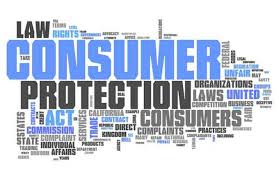Legislation that protects consumer rights
- Learning for Life and Work

- May 4, 2020
- 3 min read
Updated: May 15, 2025
Consumer protection has been written into the law to guard people against unfair trading and untrustworthy businesses/companies.
The Consumer Credit Act 2006
The Consumer Credit Act gives customers protection when entering into a loan agreement.
The details of the loan including the type of credit, duration of the agreement, APR and the rate of interest charges are all included in a Pre-Contract Information document.
The Pre-Contract Information Document is signed by both the customer and the credit provider and the customer keeps a copy of this document.
The Consumer Credit Act also allows the customer the right to a cooling-off period - this means that the customer has the right to cancel/withdraw from the loan agreement within 14 days from the date they received the funds. They then have 30 days to repay the funds.
Consumer Protection from Unfair Trading Regulations 2008
This Act protects consumers from unfair or misleading trading practices.
This means that traders are not allowed to claim something about a product that is not true.
This Act has meant that aggressive selling practices including cold calling, pressure selling and aggressive doorstep calling are banned.
Consumer Rights Act 2015
This Act ensures that:
the product a person is buying is fit for purpose and as described. This ensures that a consumer has goods which work and function as described and are not fake goods.
consumers have a legal right to demand a refund within 30 days from the date the product is brought if the goods are unfit for purpose, not as described or do not work.
if the goods were to stop working outside the 30 day refund period then the customer has the right to give the retailer one opportunity to repair or replace the goods.
a retailer is banned from misleading consumers, even through digital content, as the retailer is not allowed to claim something about a product that is not true or to advertise goods which do not exist.
the consumer is protected as a retailer is responsible for goods purchased until they are delivered into a person’s possession or someone who may have been appointed to receive the goods such as a neighbour.
QUESTIONS YOU COULD BE ASKED:
Name one piece of legislation which helps protect consumers rights. (1mark)
The Consumer Credit Act 2006
Explain two ways legislation may protect consumers when buying goods. (4marks)
Under consumer protection laws, goods must be as described, fit for purpose, and of satisfactory quality. If they are faulty, the consumer has the right to a repair, replacement, or refund. (2 marks)
When buying goods online, consumers are protected by laws that give them a 14-day cooling-off period during which they can change their mind and receive a full refund. (2 marks)
Evaluate the role of consumer legislation in protecting consumer rights when buying goods. (10marks)
Consumer legislation plays a vital role in protecting the rights of individuals when buying goods. One major benefit is that it ensures product quality and safety. Laws such as the Consumer Rights Act 2015 state that goods must be of satisfactory quality, fit for purpose and as described. This means consumers can expect a refund, repair or replacement if the product is faulty. Another advantage is that it protects consumers from misleading information. Legislation prevents businesses from using false advertising or making dishonest claims, so customers can make more informed choices.
However, consumer legislation also has limitations. A key drawback is that many people are unaware of their rights, so they may not challenge unfair treatment or request a refund. This reduces the law’s effectiveness. Another issue is that some businesses take advantage of legal loopholes. For example, they may use complicated terms and conditions or delay refund processes to avoid fulfilling their legal obligations. A final weakness is that legal action can be slow and stressful.
In conclusion, consumer legislation is essential for ensuring people are treated fairly and goods meet basic standards. It builds trust in the marketplace and helps protect people from being exploited. However, the effectiveness of the law depends on consumer awareness and the ability to enforce rights. Even though laws are in place, it can take time, effort and money to take a case to court, which puts some consumers off. However, while not perfect, these laws provide a strong foundation for consumer protection.





Comments